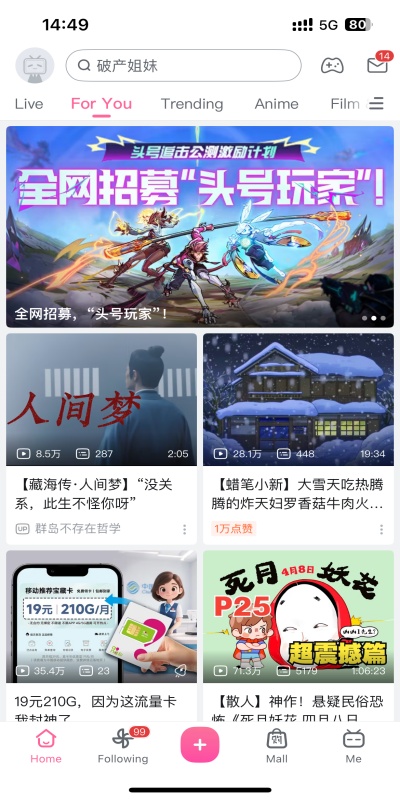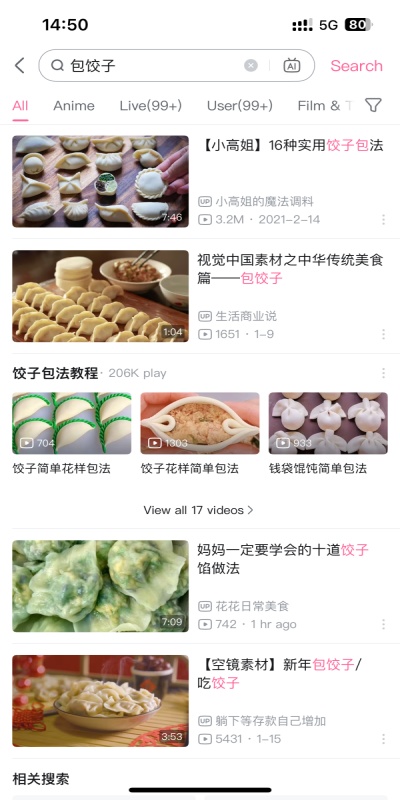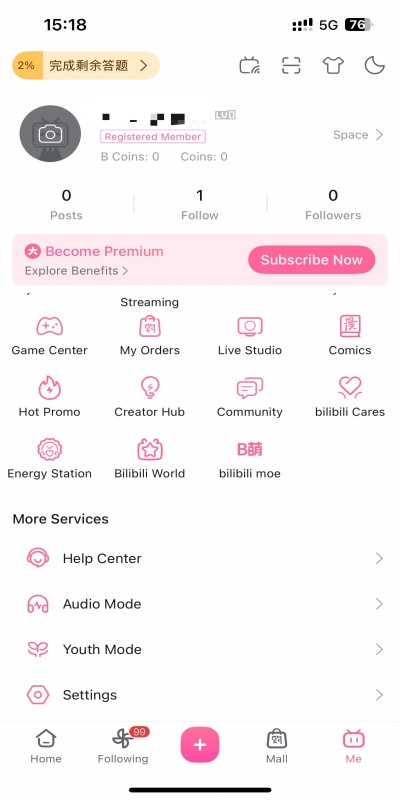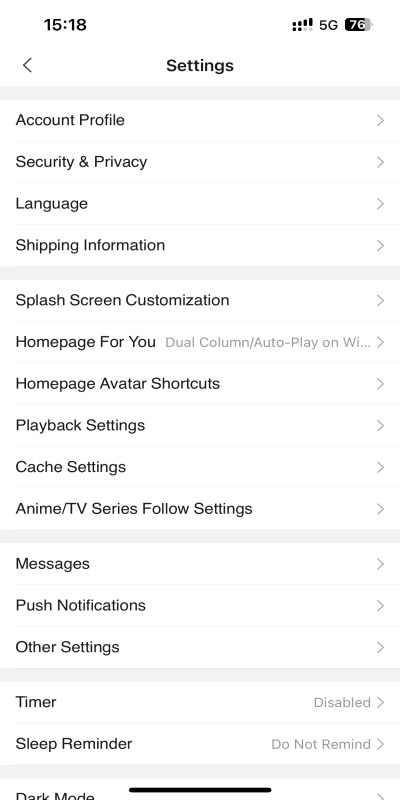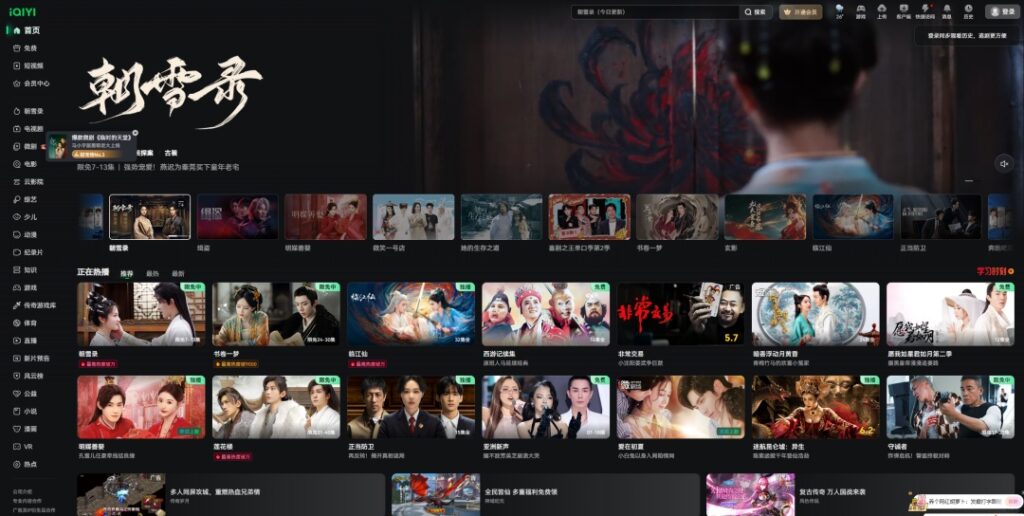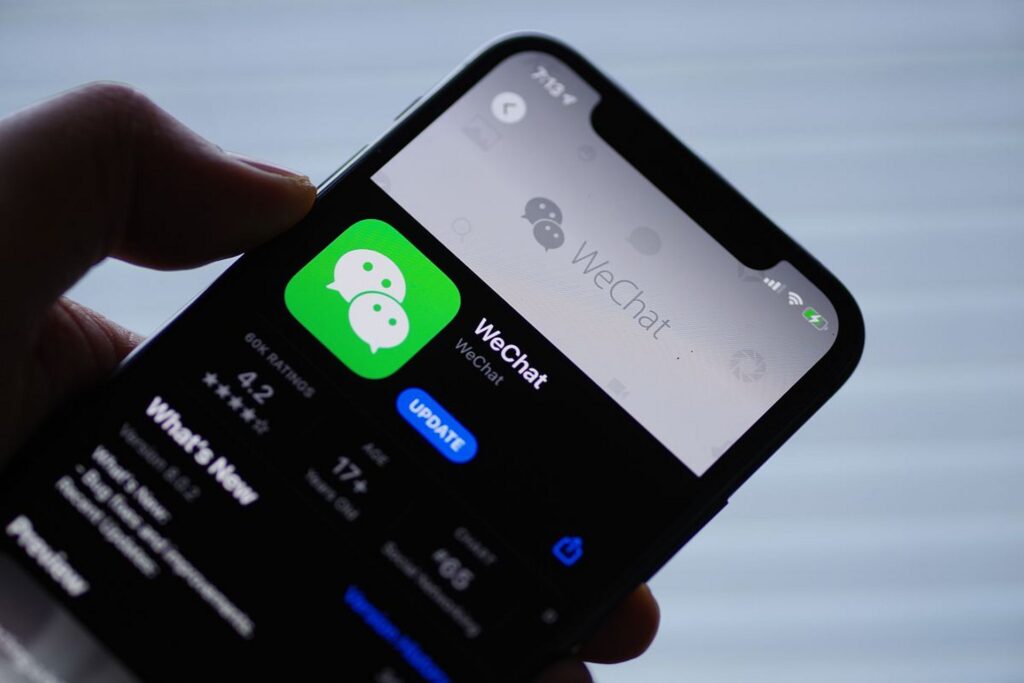Think YouTube is everywhere? Not in China. There, another platform rules—and it’s not just popular, it’s part of the culture. It’s called Bilibili, and in 2025, it’s where Gen Z hangs out, argues over anime, sends live comments flying across videos, and even learns calculus from someone in a cat hoodie. If you’ve never heard of it, you’re not alone—but if you’re planning to travel, study, or just understand how Chinese digital life really works, it’s worth taking a serious look. This guide breaks down what Bilibili actually is, how foreigners can access and use it, and why it’s quietly becoming more than just China’s YouTube.
Spoiler: You don’t even need to speak Chinese (though you might pick up a few weird words along the way).
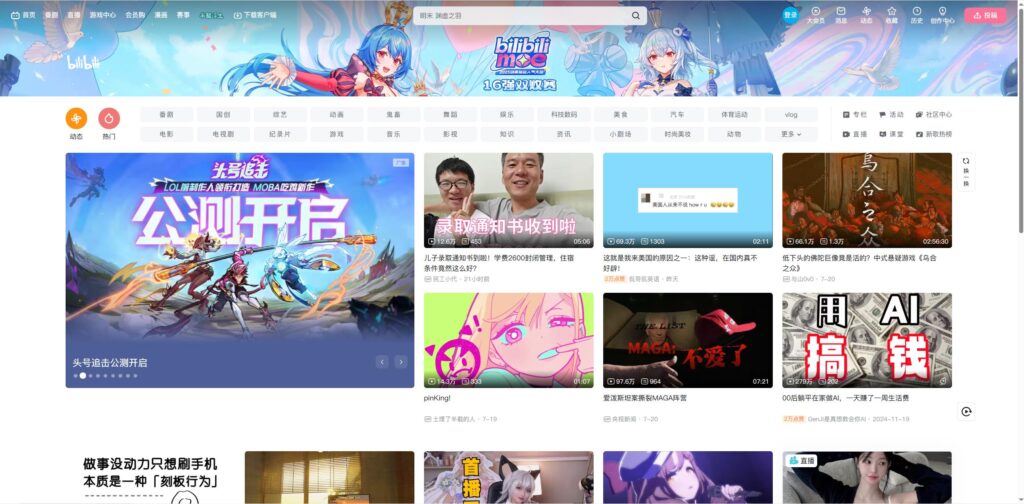
Bilibili homepage on the web
What Exactly Is Bilibili—and Why Should You Care?
From Niche Anime Site to China’s Youth Culture Hub
Back in the early 2010s, Bilibili felt like a quiet corner of the internet—mostly anime clips, inside jokes, and a lot of cat-ear avatars. It wasn’t trying to be mainstream. More like, if you knew, you knew. And that’s kind of how it built loyalty. People stuck around because it wasn’t trying to be another YouTube clone.
Then something shifted. Around 2018 or so, the platform started growing fast—and weirdly, without losing its core vibe. Suddenly, you had people uploading everything from math tutorials to train-watching videos, alongside the usual ACG stuff. Somehow it all coexisted. And that weird combo? It’s why bilibili became more than just a fan zone—it became a space for subcultures to breathe.
These days, if you ask young folks in China where they go to learn, chill, or just scroll without being yelled at by influencers, a lot of them will point to Bilibili. Not because it’s perfect—far from it—but because it still feels like theirs.
Bilibili vs YouTube: Same Format, Totally Different Soul
At first glance, it might look like Bilibili and YouTube are cousins. Scrollable feeds, autoplay videos, creators begging for follows—it all feels familiar. But scratch the surface and, honestly, they couldn’t be more different.
YouTube wants your clicks. Fast, wide, whatever sticks. Bilibili? It feels more… intimate. Like you walked into someone’s weirdly specific club and they’re cool with you hanging out—as long as you respect the vibes. The comments aren’t just under the video, they’re on it, flying past as you watch (they call them “danmu”). Sometimes you’re watching the reactions more than the actual content.
And that algorithm? It doesn’t push whatever’s viral globally. It surfaces niche stuff you didn’t know you cared about. I once ended up watching 40 minutes of a guy restoring ancient Chinese teapots—no idea how I got there. But it was kind of great.
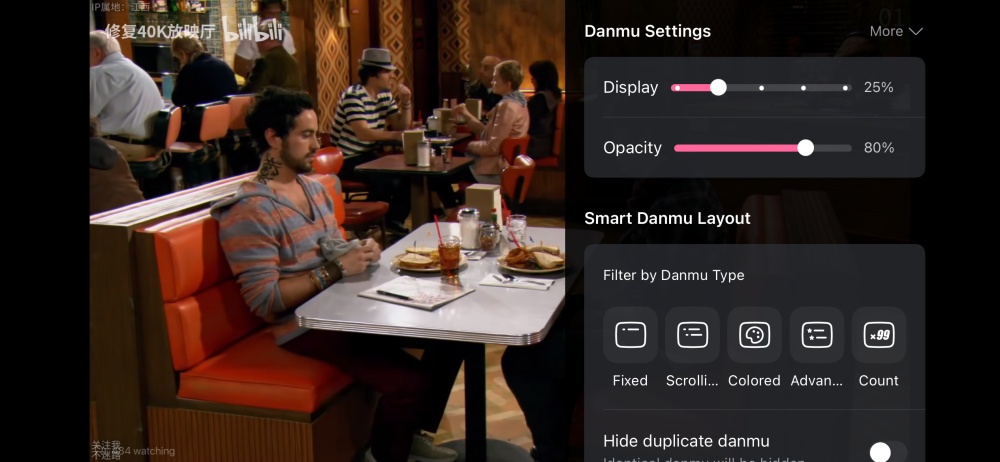
Bilibili barrage settings
Bilibili in China’s Media Ecosystem: What Makes It Stand Out?
Cultural Protection or Echo Chamber?
Here’s the thing no one wants to say outright: Bilibili thrives partly because of China’s strict content environment. Unlike YouTube, where just about anything goes (until demonetized), Bilibili operates inside a framework of censorship and “cultural responsibility.” That means you won’t find edgy political takes or Western hot-button debates here—but that’s not necessarily a bad thing for its users.
Instead, what fills the void is something different: a strangely safe, nerdy internet space. You’ll see anime review essays, math tutorials with cat memes, historical deep dives on 三国演义, and drama breakdowns with danmu flying across like a stadium wave. It’s like Reddit and Netflix had a bilingual baby—with a social contract: we don’t go too far, but we go deep.
That said, some feel this makes Bilibili too much of a comfort zone. Algorithms rarely push challenging perspectives, and viral controversies are usually “cleaned up” quickly. But maybe that’s the appeal: a place where the drama is about whether a ramen mukbang was too salty—not about politics.
Future Trends: Will Bilibili Ever Go Global?
Every now and then, someone asks: “So, is Bilibili gonna be China’s YouTube?” Honestly? Probably not. It’s tried—there was an international site for a while, some English campaigns—but nothing really stuck. Bilibili doesn’t seem interested in going global the way TikTok did. It’s more like it’s building deeper roots at home.
That said, cracks are forming in the wall. English subtitles show up more. Some creators switch between Mandarin and English mid-video without even thinking. And you’ll occasionally find a Malaysian vlogger talking about cosplay or a Singaporean food reviewer filming at night markets in Chengdu. Feels like little bridges are being built—quietly.
So will Bilibili “go global”? Probably not in the Netflix sense. But will it quietly grow into a bilingual subculture zone for anyone willing to lean in? Honestly, it already has. You just have to know where to look.
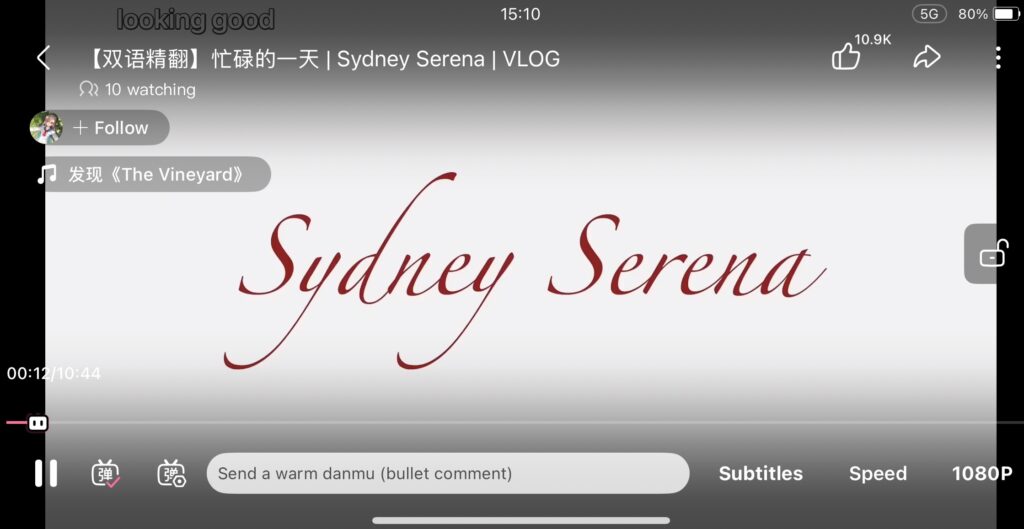
Bilingual blogger
What Foreigners Don’t Realize About Bilibili
Why It’s Not Just for Chinese Viewers Anymore
People still think Bilibili is just a quirky anime site locked behind a language barrier. That was probably true five, maybe ten years ago—but now? It’s way messier and more interesting than that. The platform’s opened up in strange little ways, especially for non-Chinese speakers. Some videos come with auto-generated subtitles, and I’ve seen more than a few travel or cooking uploads where English just casually appears halfway through.
And then there are creators who don’t even try to hide their accent or broken Chinese. One guy—I think from Thailand?—filmed vlogs around Shanghai, mixing English, Thai, and whatever Mandarin he could manage. His viewers didn’t seem to mind. Actually, they loved correcting him in the comments. That became part of the fun. It’s less about “getting it right” and more about showing up.
So yeah, Bilibili is still very much Chinese. But it’s also weirdly porous. If you’re curious, patient, and okay with feeling a little lost, you’ll fit in faster than you think.
Getting Started on Bilibili as a Newbie
First time on Bilibili? Brace yourself—it’s not exactly intuitive. The homepage throws everything at you: cartoons, reaction vids, drama recaps, subway etiquette explainers… and that’s before the danmu starts flying across the screen. It can feel like stepping into a house party mid-conversation. Loud, chaotic, but kinda warm.
The trick is to ignore most of it at first. Search something simple—like “dumpling making” or “train station vlog.” Watch a few, see what sticks. Don’t worry if you don’t understand half the UI. Everyone kind of fakes it until the algorithm figures them out. And yeah, there’s a whole “三连” culture (like + coin + favorite). You’ll see creators begging for it—it’s part meme, part ritual. Just roll with it.
Setting up an account helps, especially if you want to comment or save stuff. Foreign phone numbers work now, though you might need to poke the “send code” button a few times. Once you’re in, the chaos somehow starts to make sense. Sort of.
- front page
- Search navigation
Can You Make Money on Bilibili Without Speaking Chinese?
Real Cases of Foreign Creators Succeeding on Bilibili
It’s easy to assume you need flawless Mandarin to make it on Bilibili. But that’s not really true. A lot of foreign creators are doing well there—and not because they’re fluent. What draws attention isn’t polished language. It’s the awkward moments, the mistakes, the offbeat charm. There’s a guy from Germany who just walks around Chengdu filming his everyday life. He barely talks. Sometimes it’s just the sound of rain and him pointing at baozi. Yet somehow—he blew up.
Then there’s that student in Hangzhou—I think he was Indian?—who cooked spicy curry in a dorm kitchen with two hot plates and called it “火锅印度版.” His Chinese was a mess, but viewers loved it. Not ironically either—they were genuinely supportive. His channel turned into this shared journey of “foreign guy tries stuff.” People threw danmu like confetti every time he got a phrase wrong.
So yeah, speaking Chinese helps. But not speaking it perfectly? Weirdly, that might help more. It shows you’re trying. That effort? Bilibili eats it up.
How the Monetization System Works in 2025
Bilibili isn’t exactly like YouTube when it comes to money—but it’s not far off. In 2025, there are a few main ways you can earn: ad revenue (limited unless you’re verified), live-stream tips, brand sponsorships, and “creator support” bonuses. The last one is interesting. If Bilibili’s algorithm notices consistent engagement (watch time, comments, danmu), they may add your content into the “推荐池” (recommendation pool), giving it a big boost and sometimes a financial bonus.
However, there’s a catch: you’ll need to pass real-name verification and submit identity documents, and the platform still leans toward Chinese citizens in that process. That said, foreigners with valid passports have been approved—it just takes longer. Some use a Chinese friend’s ID to get around this, though that’s technically against the rules.
For non-native speakers, the more realistic path is: build a following through unique content, activate live-streaming (which allows tipping), and later apply for creator programs like “创作激励计划.” It’s not immediate. But then again, nothing worth doing is.
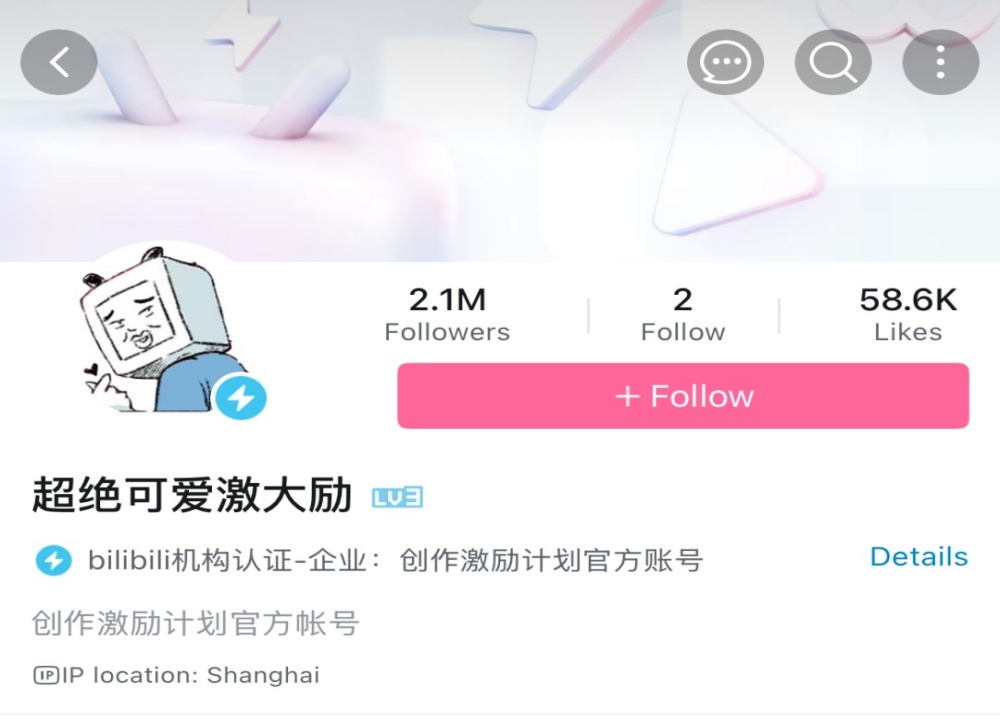
Creation Incentive Program Account
How to Download Bilibili: App, Desktop & Access Outside China
Official Ways to Download the Bilibili App on iOS and Android
If you’re using iOS, you’ve got it easy—mostly. Just switch your App Store region to mainland China, Singapore, or something similar, and search for “哔哩哔哩.” It pops right up. No need for workarounds. The pink square icon with the white TV face? That’s the one. It’s oddly cute. Just remember to switch back regions if your other apps go weird later. Been there.
Now, Android… that’s where things get a bit, let’s say, “loose.” Google Play? Often doesn’t list Bilibili unless your account’s in the right place. And even when it does show up, updates are late or flaky. So what most folks do is grab the APK from APKPure or from Bilibili’s official site. It sounds sketchy, but it’s pretty standard in this part of the internet. Though heads-up—some phones (Samsung, especially) get twitchy with installs. Meanwhile, Xiaomi phones seem to act like Bilibili’s their cousin. No issues at all.
So yeah, no VPN required, just some digital scavenger instincts and maybe a bit of tolerance for janky update cycles.
Watching Bilibili on Desktop Without Getting Lost
If you’re not keen on fiddling with apps, watching Bilibili through a desktop browser is surprisingly smooth. You go to www.bilibili.com, click around, and boom—videos start rolling. No login needed, no firewalls, just… content. Feels weirdly straightforward for a Chinese site.
But don’t expect everything to greet you in English. Even with the language set to English mode (Settings > 通用 > English), half the menus stubbornly stay in Chinese. “排行榜”? That’s rankings. “番剧”? That’s anime, mostly. You sort of pick it up as you go. Or, honestly, you just ignore it and rely on thumbnails. That’s what I still do.
Also, search is weirdly forgiving. Type “Chinese street food” or “train vlog,” and you’ll land somewhere interesting. It won’t always be what you meant, but it’ll often be what you didn’t know you wanted.
Can You Use Bilibili Outside China Without VPN?
Technically? Yes. But it’s one of those “yes, but…” situations. If you’re outside mainland China, the app still loads, videos still play—until they don’t. Some stuff, especially premium dramas or anime, may buffer endlessly or give that vague grey error message with no explanation. The danmu (弹幕) might freeze mid-video. Or payment options just vanish. It’s not always consistent, and that’s kind of the point.
A VPN set to China might solve those things—but it’s not a magic fix. In my case, once I switched to a China node, the app suddenly switched to full native Chinese, and any trace of English support disappeared. Payment menus got super finicky too. So yeah, you gain speed, but you lose your bearings.
Using Bilibili abroad kind of feels like trying to sneak into a local club where no one kicks you out, but they also never quite look at you directly.
- Personal homepage settings options
- Switch language
Frequently Asked Questions (FAQs)
Q: Is there an English version of Bilibili? I’m totally lost in the menus.
Sort of. There’s an English mode buried in settings—somewhere around “通用 > English.” That helps a little. But don’t expect miracles. Many buttons, prompts, and especially the mini-programs still speak pure Chinese. It’s like the app is half-willing to meet you halfway. That said, the more you watch, the more English-tagged content surfaces. You won’t be fluent, but you’ll stop panicking when you see “收藏.”
Q: Do I need a VPN to watch Bilibili outside China?
Most of the time? No. You can open the app or website abroad just fine. But when it comes to certain videos—especially full-length dramas or live streams—things get funky. Long buffering, missing buttons, error codes that mean nothing. A China VPN sometimes helps. But it also flips the interface back to full Mandarin, so… yeah. A win and a headache in one click.
Q: Can I sign up without a Chinese phone number?
Yup. Most international numbers work now. I used a US SIM, and after a few failed code attempts, it finally let me in. If the verification doesn’t show up right away, try toggling Wi-Fi or switching browsers. You don’t need to log in just to watch stuff—but for danmu, likes, or saving playlists, yeah, you’ll need an account. And eventually, probably ID verification.
Q: What the heck is “三连” and why is everyone asking for it?
“Sanlian” means “three-chain”—basically a like, a coin, and a favorite. It’s a Bilibili ritual. Think of it like a YouTuber asking for a thumbs-up, a subscribe, and a comment—but with more cartoon sparkles. The coin is free, by the way. You get a few every day. Tossing one is like saying, “I saw this, and I kind of love you for making it.”
Q: Can I post English content? Will anyone even watch it?
Yes. And also yes—but only if it’s good-weird. Bilibili’s crowd likes niche stuff. If you’re making quiet city walks, chaotic cooking experiments, or explaining Pokémon stats in English, there’s a chance. If you’re vlogging about “my morning routine,” maybe not. Just be specific, and try adding Chinese tags or subtitles. Even messy ones help.
Q: Why do comments fly across the screen? Can I turn that off?
Those are called “danmu,” which means “bullet screen.” They’re comments that shoot over the video as it plays. It’s wild at first—kind of like karaoke meets Reddit meets Twitch chat. Some love it. Some turn it off after five seconds. Your call. Tap the top-right toggle if it’s too much. But once in a while, someone will type something perfect at the perfect second—and suddenly, it clicks.
Q: Is this like YouTube, or something else entirely?
Depends. Bilibili looks like YouTube, sure. But once you’re in, it feels slower. Deeper. Messier. Videos get fewer views but longer watch times. People talk less like audiences and more like club members. You’ll see essays in comment sections. You’ll see creators reply. It’s more like… a hobby community with a video layer. So if YouTube is fast food, Bilibili is a home-cooked meal with three side dishes and an opinionated grandma.
